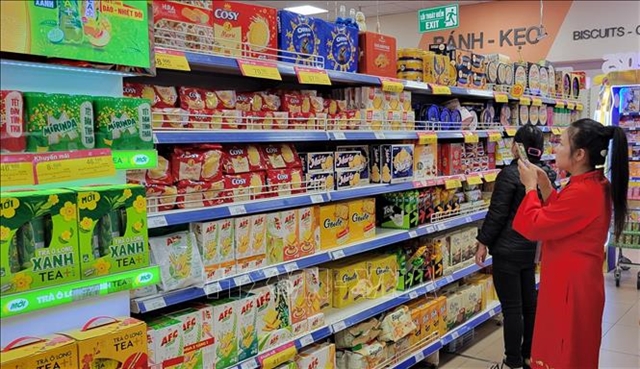Close coordination between fiscal and monetary policy, along with the Ministry of Finance’s efforts to stabilise prices, has been essential in maintaining price stability and strengthening public and business confidence, economists say.
In October 2025, the consumer price index (CPI) rose 0.2 per cent from the previous month and 3.25 per cent year-on-year. The General Statistics Office said the increase was driven mainly by food, dining-out services and education sectors directly affected by weather conditions and social demand.

Shoppers at a supermarket in Pleiku City, Gia Lai Province.
Since July, Việt Nam has been hit by 13 storms, causing severe damage in the central and northern regions, disrupting agricultural supply chains and pushing up prices of essential goods. In heavily affected provinces such as Thái Nguyên, Quảng Ninh, Đà Nẵng and Quảng Ngãi, food prices rose between 1.2 and 1.8 per cent, higher than the national average.
However, thanks to flexible price management, the average CPI over the first ten months remained within the target set by the National Assembly, increasing 3.27 per cent year-on-year. Core inflation rose only 3.2 per cent, lower than the CPI, indicating that price management policies were effective and short-term shocks had been contained.
According to the Ministry of Finance, recent price management measures have been implemented synchronously, ensuring market principles with State regulation. The ministry has closely coordinated with other ministries, sectors and localities to monitor price movements, especially for essential goods such as fuel, food, construction materials and public services.
Since early 2025, various support policies for businesses have been introduced, including a 2 per cent VAT reduction for 2025–2026, lower environmental protection tax on fuel, exemption of agricultural land use tax, deferred excise tax payments for domestically produced cars, and extensions for tax and land rent payments.
Dr Nguyễn Như Quỳnh, Director of the Institute of Economics–Finance Strategy and Policy, said: “Lower VAT and reduced import taxes on inputs help lower production costs and curb cost-push inflation. Tax and land rent deferrals act like zero per cent fiscal credit, improving business liquidity without putting pressure on money supply.”
Tight coordination between fiscal and monetary policy remains crucial for inflation control. Stable exchange rates help reduce import costs and limit external inflationary pressure, while steady interest rates allow businesses to maintain production without raising output prices.
A report by Guotai Junan Việt Nam Securities noted that Việt Nam is effectively controlling CPI components, maintaining reasonable inflation and creating room for policies that support economic growth.
Improving income and employment has also helped stabilise consumer sentiment. A survey by the General Statistics Office found that 96.1 per cent of households said their October 2025 income did not decline year-on-year, while only 3.9 per cent reported reduced income.
Lê Thị Hương, who runs a grocery store in Thái Nguyên, said: “Prices have increased slightly, but supply is stable and not scarce as before, so people feel secure when shopping.”
Nguyễn Văn Thái, a factory worker in Bắc Ninh, added: “The two per cent VAT reduction helps. Many essential goods have become more affordable, easing pressure on workers’ daily expenses.”
Nguyễn Minh Tiến, Director of the Price Management Authority, affirmed: “In the remaining months of the year, the ministry will continue to control inflation while supporting growth, production, livelihoods and the roadmap toward market-based pricing.”
The ministry will also use price-regulating tools flexibly, intensify inspections and strictly penalise unreasonable price hikes while enhancing communication to stabilise consumer and business sentiment.
In addition, fiscal policy will continue to be coordinated with monetary and other policies to stabilise the macroeconomy and control inflation, thereby supporting low-income households and vulnerable groups.
The ministry will also continue to adjust public service prices and State-managed goods following market mechanisms, prepare price scenarios for timely adjustments within its authority, and ensure transparent communication to minimise inflationary pressures.
